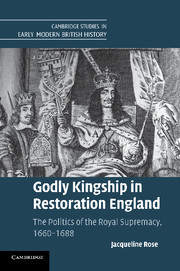Description
Godly Kingship in Restoration England
The Politics of The Royal Supremacy, 1660–1688
Cambridge Studies in Early Modern British History Series
Author: Rose Jacqueline
An innovative book exploring how tensions created by the Reformation influenced relationships between crown, Parliament and law during the Restoration.
Language: English
Subject for Godly Kingship in Restoration England:
Approximative price 32.87 €
In Print (Delivery period: 14 days).
Add to cart
Godly Kingship in Restoration England
Publication date: 01-2014
Support: Print on demand
Publication date: 01-2014
Support: Print on demand
Approximative price 100.60 €
In Print (Delivery period: 14 days).
Add to cart
Godly kingship in restoration england: the politics of the royal supremacy, 1660â1688
Publication date: 07-2011
336 p. · 16x23.5 cm · Hardback
Publication date: 07-2011
336 p. · 16x23.5 cm · Hardback
Description
/li>Contents
/li>Biography
/li>
The position of English monarchs as supreme governors of the Church of England profoundly affected early modern politics and religion. This innovative book explores how tensions in church-state relations created by Henry VIII's Reformation continued to influence relationships between the crown, Parliament and common law during the Restoration, a distinct phase in England's 'long Reformation'. Debates about the powers of kings and parliaments, the treatment of Dissenters and emerging concepts of toleration were viewed through a Reformation prism where legitimacy depended on godly status. This book discusses how the institutional, legal and ideological framework of supremacy perpetuated the language of godly kingship after 1660 and how supremacy was complicated by the ambivalent Tudor legacy. It was manipulated by not only Anglicans, but also tolerant kings and intolerant parliaments, Catholics, Dissenters and radicals like Thomas Hobbes. Invented to uphold the religious and political establishments, supremacy paradoxically ended up subverting them.
Introduction: the Restoration, the Reformation, and the royal supremacy; 1. Foundations and legacies: the Reformation and the royal supremacies, 1530–1660; 2. The Crown and the Cavalier Anglicans: prerogative, Parliament, and ecclesiastical law; 3. Spiritual authority and royal jurisdiction: the question of bishops; 4. Dissenters and the supremacy: the question of toleration; 5. Anticlericals and 'Erastians': the spectre of Hobbes; 6. Catholics and Anglicans: James II and Catholic supremacy; Conclusion.
Jacqueline Rose is a lecturer and Director of Studies at Newnham College, Cambridge. She researches and teaches extensively on early modern political, religious and intellectual history.
© 2024 LAVOISIER S.A.S.
These books may interest you

English Catholicism 1558–1642 160.25 €

English Catholicism 1558–1642 45.15 €


